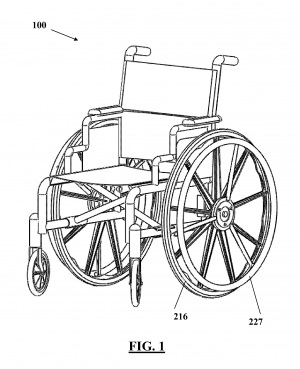One morning in the oncoming cool of fall, Scott Daigle admired the vibrant diversity of life filling the quad outside. The students enjoying the beautiful walk… except the few in wheelchairs struggling through the otherwise immaculate day. Daigle saw the chance to make a difference and never turned back.
Daigle started to develop a cyclical power transmission system for wheelchairs. He said it simply: “I wanted to create a system that would make it easier for people to push themselves without using heavy motors or batteries.” In May 2010 he met Marissa Siebel-Siero in an engineering wheelchair class and they went to work.
“IntelliWheels is an innovation house for wheelchair technologies. That means we are constantly churning out new prototypes and commercializing the ones that provide meaningful benefits to our users,” Daigle says. He sums up what IntelliWheels means to him by adding, “IntelliWheels is my baby. We created the company during grad school and we’ve been working to build it up ever since.”
 Explaining their flagship product, the Fit Grip, the IntelliTeam says: “The Fit Grips are soft rubber grips that go over the push rim to make it easier to grip. An unfortunate side effect of some types of spinal cord injuries is a reduction in hand dexterity. In cases like that, a rubber coating can be the difference between being able to push yourself, or having to In cases uniquely innovative company.use a power wheelchair. The Fit Grips solve that issue in an affordable and easy to use way.” Not only are they making it easier for wheelchair users get around, but they are making safer wheelchairs in the most affordable way.
Explaining their flagship product, the Fit Grip, the IntelliTeam says: “The Fit Grips are soft rubber grips that go over the push rim to make it easier to grip. An unfortunate side effect of some types of spinal cord injuries is a reduction in hand dexterity. In cases like that, a rubber coating can be the difference between being able to push yourself, or having to In cases uniquely innovative company.use a power wheelchair. The Fit Grips solve that issue in an affordable and easy to use way.” Not only are they making it easier for wheelchair users get around, but they are making safer wheelchairs in the most affordable way.
The Fit Grip combined with the geared wheels “2:1 ratio” make IntelliWheels a uniquely innovative company. “The geared wheels use a planetary gear system to multiply the force that you can push with. A 2:1 gear ratio let’s you turn 1 lb from you hands into two pounds that pushes you forward. Gears work with a mechanical trade off though, so even though it’s twice as easy, it’s twice as slow. That’s why the geared wheels have done well in the geriatric world.” No solar panels or fancy electronics needed here, just physics at its finest making this design practical for consumers and significantly more affordable.
An integral part to play in the history of IntelliWheel’s growth was the attainment of their patents. “The process of filing a patent is rather straightforward,” they said. “You find a good lawyer, you spend $10-20k, and you wait three years. The hard part, and the interesting part is figuring out what it is that you are going to patent and deciding whether that patent is even worth anything to your potential business. We don’t file patents on every single concept, and it’s always an interesting process to figure out which ideas are the worthy ones of such investment.”
IntelliWheels is offering the wheelchair community even more innovative projects, with their foresight, they are helping the entire industry reach their level of technological integration. When asked about Project TINKER, they explained: “Our industry is largely still in the dark ages. People still order incredibly expensive and fully custom wheelchairs via fax machines. TINKER is a way to go through the customization process in a fun and playful way online. Plans are great, but we’ve found that adaptability is even more important. TINKER is the result of setting a general strategy but being willing to move towards an opportunity when it is available.”
Located in Research Park has been an important factor to their success. As the team describes, “Being in the Research Park is like being in a cocoon of ideas, support, and likeminded people. Everywhere you turn, there is someone with a different concept to help you grow. We are incredibly grateful of the support that we’ve had from the community.”
Things to look forward to from IntelliWheels: “We would like to expand Fit Grips to add glow in the dark and other colors. We’re also planning to make a pediatric version of them. For Tinker, it’s our goal to apply our product customization process to other industries, and not just the world of wheelchairs.”








